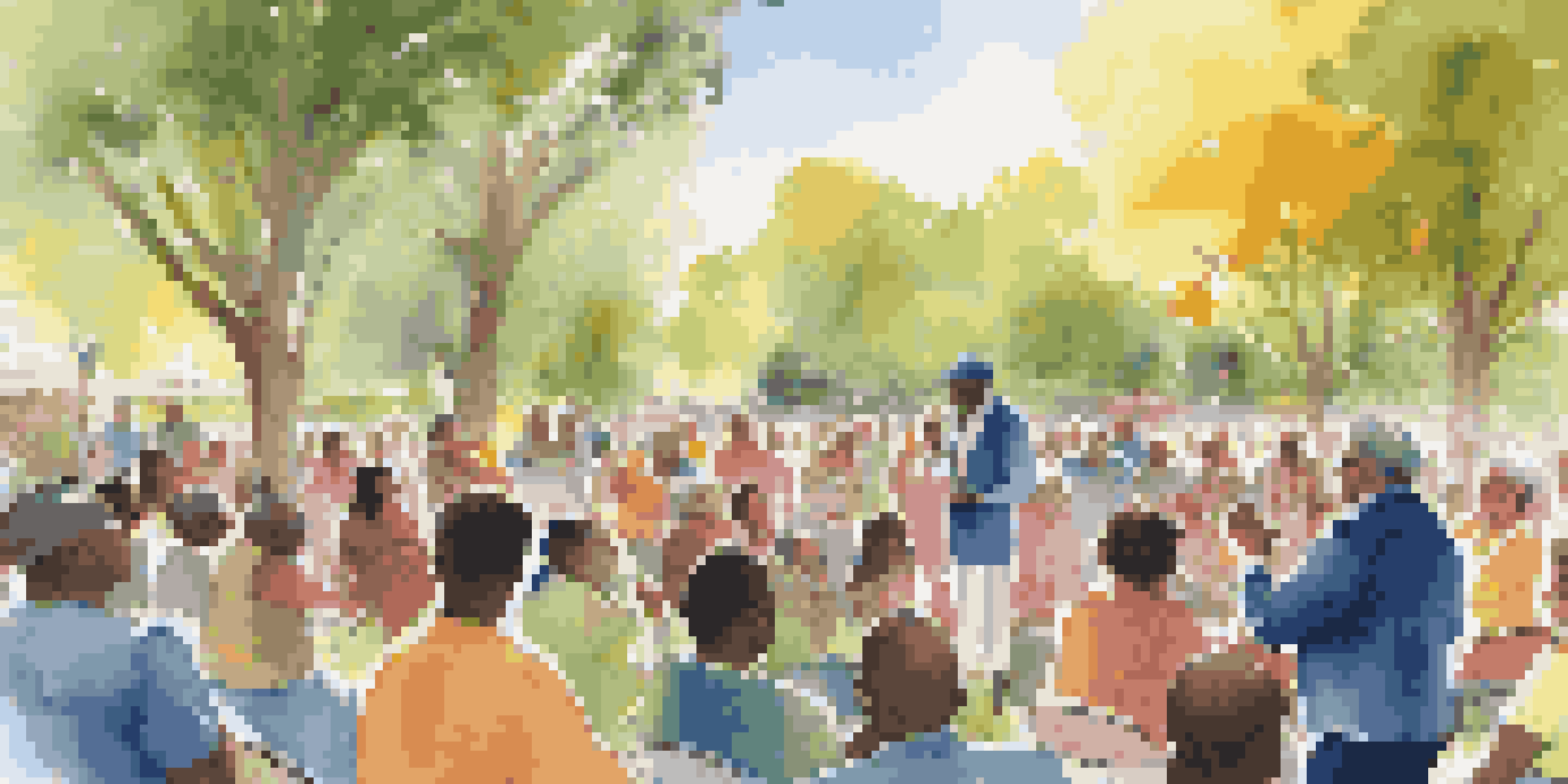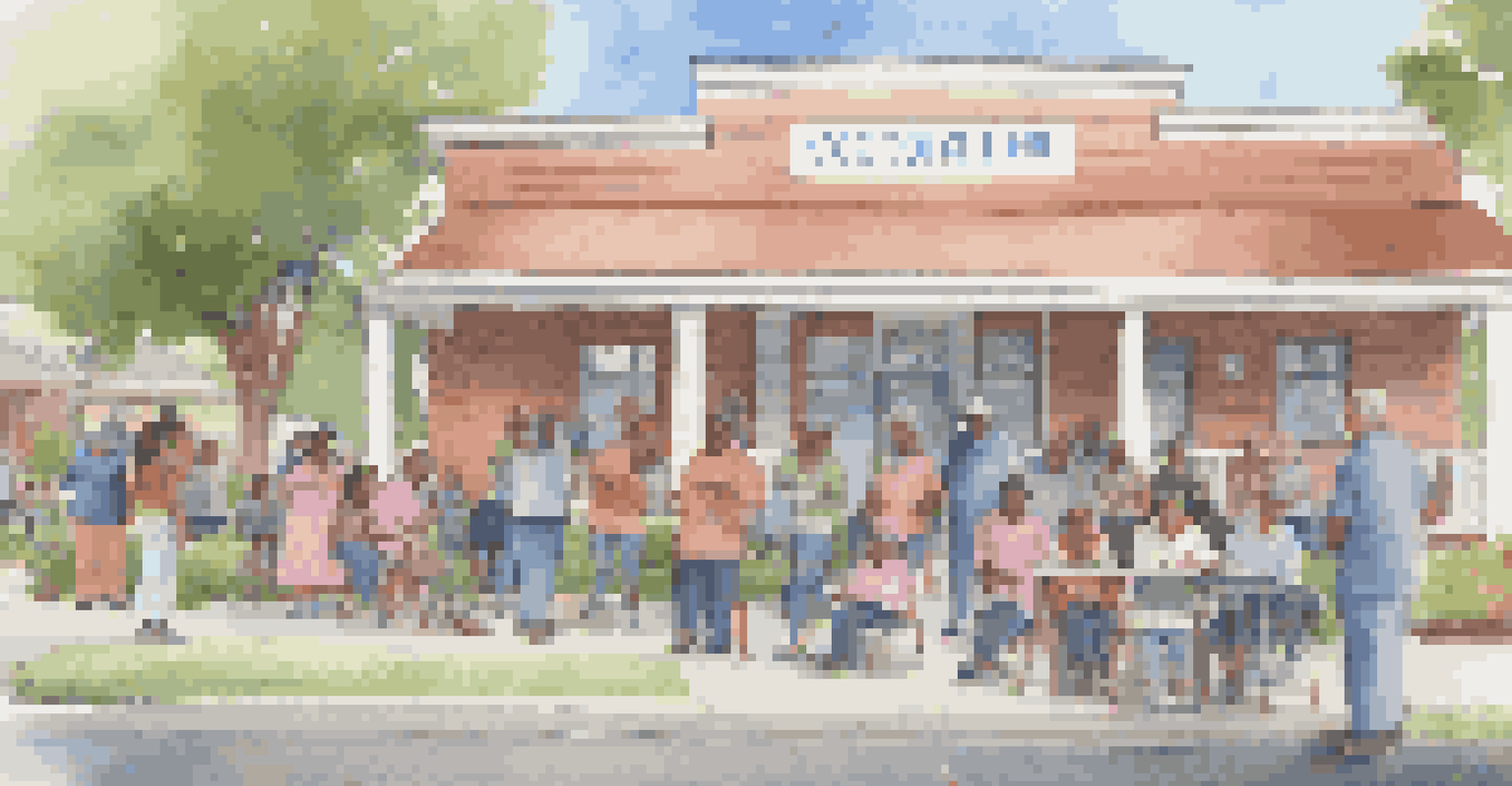Community Leaders and Vaccination: Building Trust and Awareness

Understanding the Role of Community Leaders in Health
Community leaders are pivotal in shaping health perceptions within their neighborhoods. They often serve as trusted figures, influencing public opinions and behaviors. Their deep understanding of local culture allows them to communicate effectively about health issues, including vaccination.
The greatest weapon against stress is our ability to choose one thought over another.
By leveraging their connections and credibility, these leaders can bridge gaps between health authorities and the community. This is especially crucial in areas where misinformation about vaccines may spread easily. When community leaders advocate for vaccination, they help create a supportive environment for public health initiatives.
Moreover, their involvement can lead to higher vaccination rates as they encourage conversations about health. This grassroots approach is essential in combating vaccine hesitancy and fostering a culture of trust. Ultimately, community leaders play a vital role in enhancing overall community health.
Building Trust Through Authentic Communication
Trust is the cornerstone of effective public health messaging, especially regarding vaccinations. Community leaders often establish trust through transparent and honest communication. By sharing their own experiences or knowledge about vaccines, they can demystify the vaccination process for their communities.

Moreover, it’s important for these leaders to listen actively to concerns and questions from community members. This two-way communication fosters an environment where people feel valued and understood. When individuals see that their leaders genuinely care about their health, they are more likely to consider vaccination seriously.
Community Leaders as Trust Builders
Community leaders establish trust through authentic communication, helping to demystify vaccines and encourage vaccination among their members.
Furthermore, utilizing relatable anecdotes or local stories can make the message resonate more. This approach not only informs but also empowers individuals to make informed health choices. In this way, community leaders become champions of both trust and vaccination awareness.
Combating Misinformation with Facts and Empathy
In this digital age, misinformation about vaccines can spread like wildfire. Community leaders are uniquely positioned to combat this issue by providing accurate information and addressing misconceptions. They can use social media platforms and community meetings to share factual data about the benefits of vaccination.
An ounce of prevention is worth a pound of cure.
Empathy plays an essential role in this process. Instead of dismissing concerns outright, effective leaders engage with community members and validate their feelings. This approach helps to dismantle fears associated with vaccines and fosters a more open dialogue about health.
Additionally, sharing success stories from local vaccinated individuals can also counteract negative narratives. By illustrating the positive impact of vaccines on the community, leaders can inspire others to follow suit. In doing so, they contribute to a more informed and healthier population.
Creating Accessible Vaccination Programs
Accessibility is a crucial factor in vaccination efforts, and community leaders can drive initiatives to improve this. They understand the unique barriers their communities face, whether it’s transportation issues or language barriers. By advocating for mobile vaccination clinics or multilingual resources, they can enhance access to vaccines.
Moreover, leaders can collaborate with local organizations to host vaccination events in familiar settings. This not only increases convenience but also reduces anxiety around getting vaccinated. When individuals feel comfortable in their environment, they are more likely to participate in health programs.
Combatting Misinformation Effectively
By providing accurate information and engaging empathetically with community members, leaders can address vaccine misconceptions and foster open dialogue.
Additionally, promoting these events through trusted community channels can increase turnout. Leaders can leverage their networks to spread the word, ensuring that more people are informed about when and where to get vaccinated. This proactive approach can significantly boost vaccination rates within the community.
Engaging Youth as Future Health Advocates
Engaging younger generations is essential for sustaining vaccination efforts over time. Community leaders can involve youth in health advocacy programs, empowering them to share accurate vaccine information. This not only educates young people but also helps them become influential voices in their own right.
By integrating vaccination education into schools or youth organizations, leaders can create a culture of health awareness among students. Workshops, campaigns, and peer-led discussions can be effective ways to spread the message. When young people are informed, they can influence their families and friends positively.
Moreover, involving youth in community events and initiatives fosters a sense of responsibility and ownership. As they see the impact of their efforts, they become more invested in public health. This approach not only promotes vaccination but also cultivates future community leaders.
Strengthening Community Resilience Through Vaccination
Vaccination not only protects individuals but also strengthens community resilience as a whole. When community leaders advocate for vaccines, they contribute to herd immunity, which is vital for protecting vulnerable populations. This collective effort showcases the power of community in overcoming health challenges.
Resilience is built when communities come together to support one another in health initiatives. Leaders can organize discussions about the importance of vaccination in preventing outbreaks and maintaining public health. Such conversations can galvanize community members to take action and support one another.
Engaging Youth for Future Advocacy
Involving younger generations in health initiatives empowers them to become informed advocates for vaccination, ensuring long-term community health.
Furthermore, fostering a resilient community means preparing for future health crises. When vaccination rates are high, communities can respond more effectively to potential outbreaks. This proactive stance is essential for ensuring long-term health and safety.
Celebrating Successes to Inspire Continued Action
Recognizing and celebrating vaccination milestones can motivate communities to stay engaged. Community leaders can highlight successful vaccination drives or share stories of individuals who have been positively impacted. Celebrations can serve as a reminder of the collective efforts made to protect public health.
These celebrations not only reinforce the importance of vaccination but also recognize the hard work of community members. By acknowledging contributions, leaders can strengthen community bonds and inspire ongoing commitment to health initiatives. This sense of achievement can lead to increased participation in future vaccination efforts.

Moreover, sharing successes through local media or social platforms can amplify the message. Positive stories can attract attention and encourage others to get involved. Ultimately, celebrating successes creates a cycle of enthusiasm and action for vaccination.